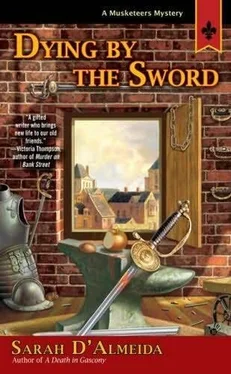Sarah D'Almeida - Dying by the Sword
Здесь есть возможность читать онлайн «Sarah D'Almeida - Dying by the Sword» весь текст электронной книги совершенно бесплатно (целиком полную версию без сокращений). В некоторых случаях можно слушать аудио, скачать через торрент в формате fb2 и присутствует краткое содержание. Жанр: Триллер, на английском языке. Описание произведения, (предисловие) а так же отзывы посетителей доступны на портале библиотеки ЛибКат.
- Название:Dying by the Sword
- Автор:
- Жанр:
- Год:неизвестен
- ISBN:нет данных
- Рейтинг книги:4 / 5. Голосов: 1
-
Избранное:Добавить в избранное
- Отзывы:
-
Ваша оценка:
- 80
- 1
- 2
- 3
- 4
- 5
Dying by the Sword: краткое содержание, описание и аннотация
Предлагаем к чтению аннотацию, описание, краткое содержание или предисловие (зависит от того, что написал сам автор книги «Dying by the Sword»). Если вы не нашли необходимую информацию о книге — напишите в комментариях, мы постараемся отыскать её.
As the Four Musketeers race to save Porthos's servant from the gallows, they run afoul of Cardinal Richelieu, who is investigating a far more serious matter – a plot against the life of the king.
Dying by the Sword — читать онлайн бесплатно полную книгу (весь текст) целиком
Ниже представлен текст книги, разбитый по страницам. Система сохранения места последней прочитанной страницы, позволяет с удобством читать онлайн бесплатно книгу «Dying by the Sword», без необходимости каждый раз заново искать на чём Вы остановились. Поставьте закладку, и сможете в любой момент перейти на страницу, на которой закончили чтение.
Интервал:
Закладка:
The door was heavy and, to Porthos’s eyes, looked like oak. In the almost complete dark, he found the lock on it, part by touch and part by sight. It was a sturdy lock. But then Porthos was an unusually sturdy man. In fact, he had often been compared to the giants in the Bible-and he was never sure the comparison was meant as flattery. He had often thought when he retired from the musketeers he would devote his life to replicating the feats of Hercules, at least those that didn’t involve dressing up as a girl, which he had the vaguest of ideas Aramis had once told him Hercules had done. Of course, Aramis might have been lying. The fact that Athenais once, for the purpose of hiding him, had dressed Aramis in a fashionable green dress [3]still seemed to rankle Porthos’s friend.
So he set his hands to the wood, one massive hand pushing against a panel of wood, while the other seized hold of as much of a lip as there was on the other side of the door and pulled. His first attempt at applying force caused the lip of the wood to crack and splinter. However, it also pulled the door slightly out of true, giving Porthos a firmer grasp on that side of the door. With that firmer grasp, well past the lip that covered the joining of the two halves, Porthos pushed and pulled again.
Meeting with resistence, he thought that the lock might have been forged by the late armorer who, as Porthos had told his comrades, was known for metals of exceptional resistence and strength.
But just as he thought it was a lost cause, he heard wood splinter, as the lock, under pressure and not breaking, parted company with the more fragile oak. The side of the door that had been under the lip of the other side let loose and swung inward into the shadows of the armory.
Porthos paused, long enough to recover his breath, and then entered the armory in turn.
It was warm. Even during a winter night, the armory retained some of the heat of the forges, a heat augmented by the banked fires-the embers of the last fires, now covered in ashes, to keep them smoldering but not burning-glowing in the massive hearths.
The armory looked like a very large smithy, with two large forges and a succession of smaller ones. Porthos did not doubt that if Monsieur Langelier had been born and lived in a village that was exactly what he would have been, his talent for weapons notwithstanding. He’d have run a smithy and shod horses and mended plows and shovels as often as he would get to mend the occasional sword or create the occasional knife. Or rather, far more often, for those were the services that people in villages needed more often.
Even if there were a seigneur, in a village, it was not to be thought he would engage in dueling all that often. Not even with the lords of neighboring villages. Well, at least not, he corrected himself, scrupulously, unless he chanced to be of the same disposition as D’Artagnan’s late father, who seemed to duel with even his best friends, just to keep in practice.
But, generally, in such small, confined societies, even the most bellicose of lords had to keep on good terms with his neighbors, and certainly couldn’t afford to duel any of them to the death.
In Paris, however, people of Monsieur Langelier’s abilities could obtain ample reward for them, and do nothing but work upon swords all day long. The evidences of this work, in the shape of swords in various stage of finishing piled in corners and hung upon walls and depended from racks on the ceiling. Even in the dark, Porthos could catch glimmers of their shapes and his practiced eye could have told which ones were finished-by and large the ones on ceiling racks and walls-and which ones were not-mostly the ones in piles, in various places throughout the workshop.
Without light, he could tell nothing else, but fortunately Porthos, in what Athos doubtlessly would call one of his strangely provident turns of mind, had thought to stop on the way here and provide himself with two candles from his lodging. Not that stopping had interrupted his thoughts or given him much pause. Or that he had even thought of what he might use the candles for. If he were forced to explain his decision to bring candles in so many words, he would say that he realized he would need light to see by, and that an armorer’s, after nightfall and closing, was unlikely to provide that.
Now he made sure that the door was closed again and met as nearly as it could, so no light escaped from within. Then, in darkness even deeper than before, he went to the big hearth. Using one of the pokers nearby, he moved aside some of the ash from atop the embers, and touched the wick of one of the candles to it, then smiled and sighed as the light came up, pure and white.
The candle was made of the best wax, the sort of wax often burned at cathedrals during Mass. Heaven only knew where Mousqueton had got it, though of course Porthos hoped he hadn’t stolen it from the cathedral.
He didn’t think so. Mousqueton was of a larcenous frame of mind, but not an impious one. Now, stealing it from one of the merchants who sold to the cathedral before they could make delivery, that was something else, and he wouldn’t answer for it that Mousqueton hadn’t done so.
At any rate, the light was much better than anything that anyone had any right to expect from a single candle, and Porthos dripped some wax onto one of the large anvils, and stuck the candle to it as it hardened. Then he looked around.
Given the benefit of the light, and his reasonably sharp eyesight, he could see this was where the murder had happened-right there, next to the anvil, where a dark stain marred the dirt floor.
Porthos looked up, almost instinctively, at the weapons hanging over the forge. Swords. Just swords. But… Porthos was sure that they’d said that Mousqueton had been felled by a hammer falling from the rack over the anvil.
Well, let’s imagine then, he thought, that there truly was a hammer hanging up there amid the swords.
He frowned. It seemed a very unlikely thing to imagine. The racks were affixed to the ceiling of the workshop, more than ten feet up. At least Porthos presumed so because he was a very tall man, and yet with his arm extended he could not reach the tip of those swords. He could tell that these were the armorer’s best swords-shining examples of the sword-maker’s art. Which explained, of course, why they were hung so far up and out of reach of anyone who might come into the workshop and perhaps momentarily manage to distract the armorer with talk.
The inferior swords were hung from the wall, where the enterprising might reach them, but not these. So why would anyone hang a hammer-a tool of the trade-that far out of reach?
It made no sense at all. First, all the hammers Porthos could see were either dropped here and there, haphazardly, or stacked neatly near one of the anvils. In either case, he thought, they were where they could be quickly reached.
And besides-he frowned up into the dark recesses of the ceiling from which the racks hung-wouldn’t a hammer falling from that distance onto someone’s head kill them? Instead of just stunning them? Well… perhaps not. Perhaps if it only hit a glancing blow. And it would depend on the size of the hammer. I guess I’ll have to try it to see.
Porthos was, in fact, very much a man who could not believe without seeing. Aramis, once, mid-argument, had flung at him that he was a doubting Thomas. Porthos could perceive from the tone of voice and the expression on Aramis’s face that the blond musketeer meant this as a terrible insult. It had missed its mark. As far as Porthos was concerned, Saint Thomas was the only man who had handled Christ’s resurrection the way it should have been handled.
After all, if your teacher and master, who claims to be the son of God himself, has just returned from the dead, wouldn’t you want to make sure it was him and not some fakery, by putting your fingers or hand into his wounds? Else, how would you know it wasn’t just something painted on, and the look on the man’s face a mere casual resemblance? And if you were going to go out preaching this as truth to the whole world, how could you not need to know for sure?
Читать дальшеИнтервал:
Закладка:
Похожие книги на «Dying by the Sword»
Представляем Вашему вниманию похожие книги на «Dying by the Sword» списком для выбора. Мы отобрали схожую по названию и смыслу литературу в надежде предоставить читателям больше вариантов отыскать новые, интересные, ещё непрочитанные произведения.
Обсуждение, отзывы о книге «Dying by the Sword» и просто собственные мнения читателей. Оставьте ваши комментарии, напишите, что Вы думаете о произведении, его смысле или главных героях. Укажите что конкретно понравилось, а что нет, и почему Вы так считаете.











